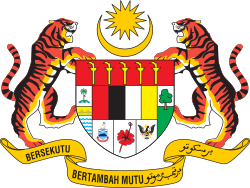In March 1947, the first Pan-Malayan Islamic conference was held at Madrasah Ma'ahad al-Ehya as-Sharif, Gunung Semanggol, Perak. The conference was organized by the Parti Kebangsaan Melayu Malaya (PKMM) led by Dr. Burhanuddin al-Helmy to discuss economic problems faced by the Malay-Muslim community and to encourage greater political activism among Islamic groups. As a result, the Supreme Religious Council of Malaya or Majlis Agama Tertinggi Malaya (MATA) was formally established. [1]
Following a second MATA conference from 13 to 16 March 1948, Parti Orang Muslimin Malaya or Hizbul Muslimin was formally founded. The party leadership included Ustaz Abu Bakar al-Baqir, Dr. Burhanuddin al-Helmy, Ustaz Abdul Rab, and Kyai Masyhur Azahari, a figure associated with Indonesia's Masjumi party. Hizbul Muslimin adopted an Islamist-nationalist platform, advocating for independence and the establishment of Islamic governance. It was structured into eight bureaus covering religious affairs, education, politics, economy, society, youth, women's issues, and public information. [3]
UMNO representatives, alarmed by the militant tone of the Islamists, reported to party president Dato' Onn Jaafar, who famously warned: "Hubaya, hubaya! Bahaya dari gunung!" ("Beware, beware! Danger from the mountain!"), referring to the MATA leadership at Gunung Semanggol. [1] [4]
Hizbul Muslimin also expressed solidarity with global Muslim struggles, notably in Palestine and Patani, sending protest letters to the United Nations and urging Malay rulers to act. However, the British colonial authorities viewed the party as a subversive movement with suspected ties to leftist groups such as the Communist Party of Malaya (CPM). [5]
Following the declaration of the Malayan Emergency in June 1948, Hizbul Muslimin was outlawed under the Emergency Ordinance, and many of its leaders were arrested. The party ceased to operate soon thereafter. [6]
This page is based on this
Wikipedia article Text is available under the
CC BY-SA 4.0 license; additional terms may apply.
Images, videos and audio are available under their respective licenses.

